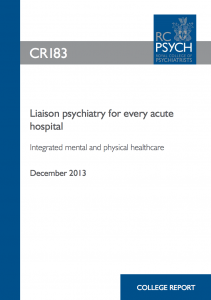
When I am not being an elf, I am very proud to work within Liaison Psychiatry and to be actively developing Liaison services across Kent and Medway. For those of you who haven’t come across Liaison before, we work within the overlapping area between physical health and mental health, so dealing with physical health problems and mental health problems in unison. Groundbreaking eh?! I particularly like that Liaison is one of the key areas where psychiatry can impact on the thinking of not just mental health health professionals, but general health professionals and the public alike.
Overall in healthcare there appears to remain a rather Cartesian divide between the mind and body, which comes into focus no greater than within a general hospital. The view of the mind as being wholly separate from the corporeal body needs to change; after all, if your car had an undiagnosed fault and you took it to a garage, you would expect them to look at all of it, not just the electrics, wouldn’t you? Why should we accept any different in healthcare?
On the 20th December 2013 the Royal College of Psychiatrists released their report Liaison psychiatry for every acute hospital: integrated mental and physical healthcare (PDF). This report replaces Psychiatric services to accident and emergency departments from 2004 and it has certainly raised the stakes in the world of Liaison Psychiatry. To add weight and gravitas to the report it has the backing of six other professional bodies: the College of Emergency Medicine, College of Mental Health Pharmacy, Royal College of General Practitioners, Royal College of Nursing, Royal College of Physicians and the Society for Acute Medicine.
Just this past week the Royal College of GPs have announced that mental illness is rising and that doctors need more training in mental health. I cannot imagine that this will be solely limited to the community. The report makes invaluable reading for anyone wanting to develop or advance their Liaison services; helpfully outlining the background to the need, the scale and nature of the problems needing specialist services (including case examples illustrating gains to be made from investment in a liaison psychiatry service) suggested service design, how to deliver integrated governance of a liaison psychiatry and examples of clinical topics than can be managed by Liaison Psychiatry.
Why is liaison psychiatry important?
- At any one time 30-60% patients in any one general hospital will have problems related to their mental health; a figure much higher than is found in the general population
- The most common mental health problems in general hospital patients are self-harm, depression, dementia and alcohol-related disorders
- Many acute hospital staff lack the training, knowledge and skills to recognise and manage these conditions
- Almost one in three liaison psychiatry staff (33%) believe this has adversely affected patient care
Research has also shown that having a liaison service in place can have financial benefits for hospitals:
- Reducing patients’ length of stay
- Reducing rates of readmissions and investigations
- Improving the care of people with medically unexplained symptoms, dementia and long-term conditions
The extra cost of physical healthcare in acute hospitals, associated with comorbid mental health problems (including medically unexplained symptoms) is £6 billion a year – equivalent to 15% of the total spend of these hospitals.
Recommendations
The report makes a series of recommendations on how liaison services should be designed, including:
- Liaison psychiatry services should be funded and planned in conjunction with physical services, so that both the physical and mental health problems of patients can be well managed
- Patients in acute hospitals should have equitable access to a consultant psychiatrist for mental health problems, as well as to a consultant for their physical health
- All liaison psychiatry service functions should be provided five days a week, and all emergency or urgent clinical problems should be covered seven days a week
- Liaison services should aim for a maximum response time of within 1 hour for emergency referrals and 1 day (usually within 5 working hours) for urgent referrals
Some of these will need to be tailored to the local needs of the population though, taking into account the local geography and morbidity, however they should all be possible.
This report shows that liaison psychiatry is a crucial service for every acute hospital. This will improve quality of care and safety for patients as well as improving efficiency that is vital to the sustainability of our hospital systems.
I struggle to see how a general hospital can be truly effective and efficient without a Liaison Psychiatry Service and urge any interested parties to distribute the findings of this paper far and wide across their own patch of the woodland!
Link
Liaison psychiatry for every acute hospital: integrated mental and physical healthcare (PDF). Royal College of Psychiatrists College Report 183, Dec 2013.




RT @Mental_Elf: Liaison Psychiatry for all!! @LiaisonLawson welcomes the new @rcpsych report http://t.co/nejkpkY2Wx
Liaison Psychiatry for all!!: When I am not being an elf, I am very proud to work within Liaison Psychiatry an… http://t.co/kfzauDjLEZ
Our very own Liaison Psychiatrist @LiaisonLawson has blogged today on (you’ve guessed it) liaison psychiatry. Huzzah! http://t.co/DstxayexI5
@Mental_Elf @LiaisonLawson An excellent blog on need for liaison psychiatry. Here’s the evidence we found of benefits http://t.co/vYfYVIfNMd
Patients inpatients should have equitable access to a psychiatrist for mental health as well as physical health see http://t.co/s3gLtKzklJ
@rcpsych Please send us your feedback on our #LiaisonPsychiatry blog http://t.co/DstxayexI5 @LiaisonLawson
@Mental_Elf @LiaisonLawson It’s a great blog – thanks very much for sending the link, and highlighting our College report so well
Liaison Psychiatry for all!! By a Liaison Elf!! @LiaisonLawson http://t.co/cipDOKxZHx
At any one time, 30-60% patients in a general hospital will have problems related to their mental health http://t.co/DstxayexI5
Replace the word ‘psychiatry’ in this with ‘disability’ and narrative is as justified/identical. http://t.co/j5S4NDtLrC #HospitalComms
Great new @Mental_Elf blog by @LiaisonLawson about the importance of liaison psychiatry & our recent College report http://t.co/b76FDS3ChV
The most common mental problems in general hospital are self-harm, depression, dementia & alcohol-related disorders http://t.co/DstxayexI5
RT @Mental_Elf: Kerching! Listen up CCGs – Liaison Services can save YOU money http://t.co/DstxayexI5 #LiaisonPsychiatry
RT @LiaisonLawson: @NHSSKCCCG Essential reading! @Mental_Elf: Liaison Psychiatry for all!! @LiaisonLawson welcomes new @rcpsych report http…
“Liaison psychiatry is a crucial service for every acute hospital” according to the @rcpsych http://t.co/DstxayexI5
@Mental_Elf @AlysColeKing @rcpsych very true. I work in a RAID team and without it so many people would slip through unnoticed.
Mental health in the general hospital? There’s a name for that… http://t.co/E7SeK40WbB @LiaisonLawson in @Mental_Elf
In case you missed it earlier: Liaison Psychiatry for all!! @LiaisonLawson welcomes the new @rcpsych report http://t.co/DstxayexI5
MT @Mental_Elf: Liaison Psychiatry for all!! @LiaisonLawson welcomes the new @rcpsych report http://t.co/iDL2U7LtrK <– Imp & Informative.
Mental Elf: Liaison Psychiatry for all!! http://t.co/W6kVdgRT8O
Just as there are gaps in the provision between physical and mental health there are equal if not bigger gaps in those with dual diagnosis